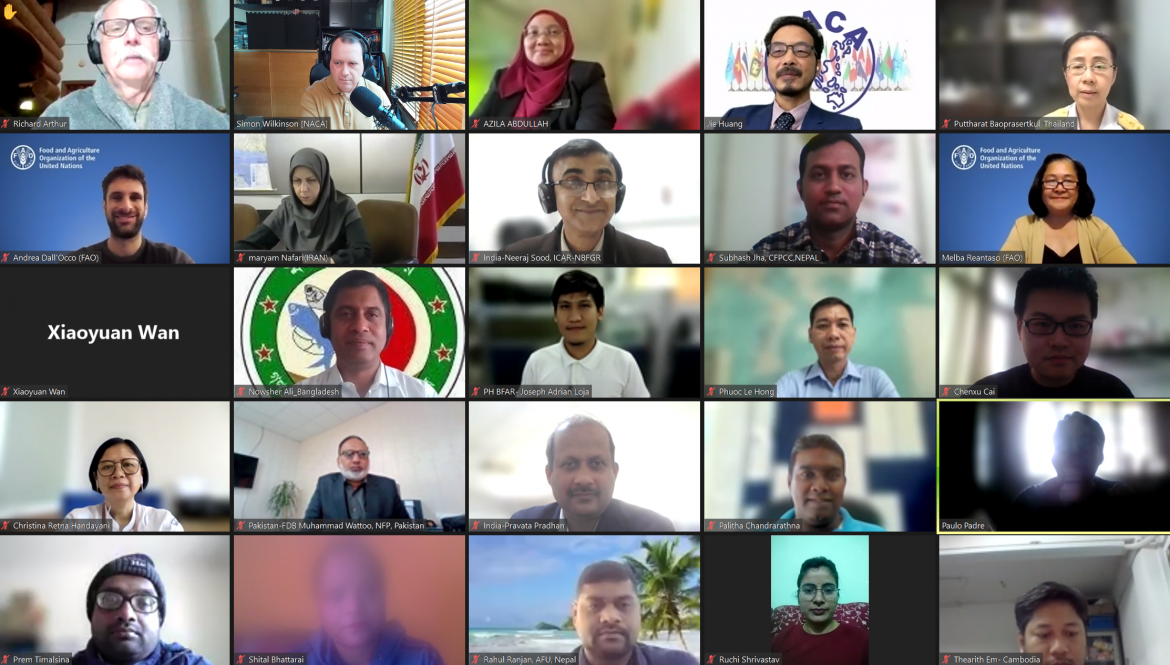FAO/NACA workshop to developing a regional strategy for aquatic organism health using progressive management pathways
2 December 2022 | 824 views | Better management practices, Freshwater finfish, Hatchery and nursery, Health and welfare, Inland aquaculture, Marine finfish, Aquatic plants, Molluscs (shellfish and other), Shrimp, Crabs and lobsters, Stock enhancement, Training and education, Markets and trade, Freshwater prawns, Echinoderms (sea cucumbers, urchins), Ornamentals, Artemia

On 28-29 November FAO and NACA collaborated on a virtual workshop to develop a regional strategy for aquatic organism health, using a progressive management pathway for improving aquaculture biosecurity. The workshop was held under the auspices of the project “Responsible use of fisheries and aquaculture resources for sustainable development component 3: Biosecurity and health management”. The workshop involved 31 experts from 16 countries, including national focal points, FAO and NACA.
The objectives of the workshop were to:
- Present the country responses to a FAO self-assessment survey on biosecurity and health management capacity and performance.
- Present a preliminary analysis of the combined survey returns.
- Provide guidance to country participants on conducting a SWOT analysis.
- Prepare a detailed plan for Phase II of the initiative.
The trend in aquaculture during the last few decades is that serious pathogens frequently emerge, spread rapidly, and cause major production losses. There is often a long period, usually years, from the time that a serious mortality event caused by an unknown and emerging pathogen is observed in the field, to its subsequent identification and confirmation, to global awareness, the establishment and implementation of surveillance and reporting/notification systems and cost-effective risk management measures.
Biosecurity measures are less expensive when put in place preventatively and are significantly more costly when implemented in response to disease outbreaks. Biosecurity should be put in place and parallel to any aquaculture development by all producing countries. However, countries are at widely varying stages of aquaculture development, and vary in their technical capacity and resources available to manage aquatic health issues. While some countries in the region have a high proportion of industrialised production, others have many small-scale, resource-poor farmers that are in dire need of technical support.
During the last few years, FAO and partners have developed the “progressive management pathway for improving aquaculture biosecurity” concept (PMP/AB), an extension of the “progressive control pathways” used for controlling major livestock and zoonotic diseases. As the name suggests, these progressive pathways enable risk management approaches to be tailored to suit the technical capacity and resources of stakeholders at different levels, or with different roles, while maintaining a coordinated national approach. The approach also focuses on progressively building management capacity through combined bottom-up/top-down approaches with strong stakeholder engagement.
The PMP/AB is a pathway aimed at enhancing aquaculture biosecurity capacity at the regional, national, local-sector and enterprise levels by building on existing frameworks, capacity and tools using risk-based approaches and public-private sector partnerships. Whereas most progressive control pathways focus on the control of a single disease or disease complex, the PMP/AB focuses on building a generalised resilience to aquaculture biosecurity vulnerabilities, e.g. threats to sustainable aquaculture due to pathogens and the associated diseases that result from poor management practices, legal and uncontrolled trade, and lack of capacity in public and private institutions.
The PMP/AB addresses the lack of effective national plans by focusing on mid- to long-term national aquaculture biosecurity strategy development processes and by promoting a co-management approach to actively engage stakeholders. Specifically, the PMP/AB enhances awareness and adoption of appropriate biosecurity governance at the producer and sector levels, which can lead to reduction in the incidence and impact of targeted priority diseases and thus promotes greater recognition of the important role of biosecurity. The PMP/AB provides a solid platform for public-private sector partnership, as PMP/AB’s strategic and implementation plans should be jointly developed by industry stakeholders and governance authorities. This encourages buy-in and best-fit for each country, whilst providing a template that delivers a degree of consistency between participating countries or regions.
The preparation conducted during this workshop will feed into a physical meeting to finalise a regional biosecurity strategy. Further details will be announced on the NACA website and in this newsletter in due course.
Creative Commons Attribution.